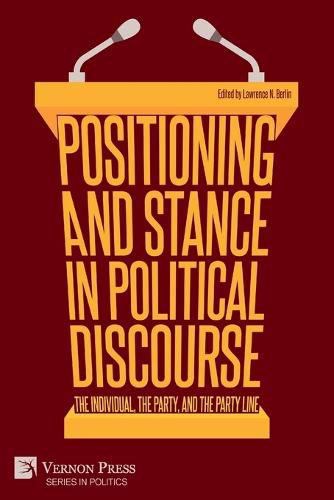Readings Newsletter
Become a Readings Member to make your shopping experience even easier.
Sign in or sign up for free!
You’re not far away from qualifying for FREE standard shipping within Australia
You’ve qualified for FREE standard shipping within Australia
The cart is loading…






This title is printed to order. This book may have been self-published. If so, we cannot guarantee the quality of the content. In the main most books will have gone through the editing process however some may not. We therefore suggest that you be aware of this before ordering this book. If in doubt check either the author or publisher’s details as we are unable to accept any returns unless they are faulty. Please contact us if you have any questions.
Within the political sphere, a political actor is often judged by what he or she says, with their verbal performance often perceived as representative of the individual. Hearers accept that, as individuals, they possess a lifetime of experiences and actions which inform, but may also undermine, their aspirations in gaining political capital. Additionally, as representatives of a political party and its ideology, these actors do not exist in isolation; they are members and, at times, potential candidates of a particular party with its own agenda which may, in turn, cause them to modify their personal speech to align with espoused policies of the party.
The various contributions contained in this volume examine the discourse of political actors through the lenses of positionality and stance. Throughout its chapters, clearly defined theoretical perspectives and specified social practices are employed, enabling the authors to elucidate how political actors can situate themselves, their party, and their opponents toward their ostensive public. This book successfully demonstrates how espoused perspectives relate to, or reflect on, the nature of the individual political actor and their truth, the party they represent and its ideology, and the pandering to popular public opinion to gain support and co-operation.
This book will hold particular appeal for postgraduate students, researchers, and scholars of discourse studies, pragmatics, political science, as well as other areas in humanities and the social sciences.
$9.00 standard shipping within Australia
FREE standard shipping within Australia for orders over $100.00
Express & International shipping calculated at checkout
This title is printed to order. This book may have been self-published. If so, we cannot guarantee the quality of the content. In the main most books will have gone through the editing process however some may not. We therefore suggest that you be aware of this before ordering this book. If in doubt check either the author or publisher’s details as we are unable to accept any returns unless they are faulty. Please contact us if you have any questions.
Within the political sphere, a political actor is often judged by what he or she says, with their verbal performance often perceived as representative of the individual. Hearers accept that, as individuals, they possess a lifetime of experiences and actions which inform, but may also undermine, their aspirations in gaining political capital. Additionally, as representatives of a political party and its ideology, these actors do not exist in isolation; they are members and, at times, potential candidates of a particular party with its own agenda which may, in turn, cause them to modify their personal speech to align with espoused policies of the party.
The various contributions contained in this volume examine the discourse of political actors through the lenses of positionality and stance. Throughout its chapters, clearly defined theoretical perspectives and specified social practices are employed, enabling the authors to elucidate how political actors can situate themselves, their party, and their opponents toward their ostensive public. This book successfully demonstrates how espoused perspectives relate to, or reflect on, the nature of the individual political actor and their truth, the party they represent and its ideology, and the pandering to popular public opinion to gain support and co-operation.
This book will hold particular appeal for postgraduate students, researchers, and scholars of discourse studies, pragmatics, political science, as well as other areas in humanities and the social sciences.